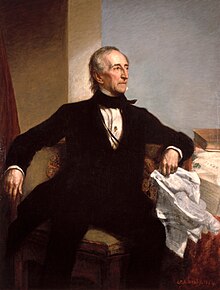📖 Presidential Profile
Comprehensive overview of leadership, policies, and historical significance
📋 Biography & Political Journey
The Accidental President
John Tyler became president under unprecedented circumstances when William Henry Harrison died just 31 days into his presidency in 1841. The Constitution was unclear about whether the vice president should become acting president or assume the full presidency, leading to a constitutional crisis. Tyler boldly asserted that he was the legitimate president, not merely an acting president, establishing the precedent that still governs presidential succession today. His political enemies mockingly called him “His Accidency,” but Tyler refused to acknowledge any correspondence addressed to the “Acting President.”
Tyler’s presidency was marked by his fierce independence and strict constitutional interpretation. Despite being elected on the Whig ticket, he vetoed most of the Whig Party’s key legislation, including bills to establish a national bank and raise tariffs. His states’ rights philosophy and opposition to federal overreach put him at odds with both Whigs and Democrats. Tyler believed in limited federal government and consistently opposed what he saw as unconstitutional expansions of federal power.
One of Tyler’s most significant achievements was the annexation of Texas in 1845, just days before leaving office. He accomplished this through a joint resolution of Congress rather than a treaty, which required only a simple majority rather than the two-thirds Senate majority needed for treaties. This creative constitutional interpretation allowed Tyler to fulfill his goal of western expansion while working around Senate opposition to Texas statehood.
The President Without a Party
Tyler’s stubborn independence came at a steep political cost. In 1841, after vetoing a bill to create a national bank, his entire cabinet resigned except for Secretary of State Daniel Webster. The Whig Party formally expelled him, making him the first president to serve without party support. Democrats also rejected him, leaving Tyler politically isolated. He attempted to form his own political party but failed to gain traction. His presidency was marked by constant battles with Congress, earning him the distinction of having more of his vetoes overridden than any president except Andrew Johnson. The political establishment’s hostility toward Tyler was so intense that when he sent nominations to the Senate, they were often rejected purely out of spite.
The President’s Surprising Retirement Career
After leaving the presidency in disgrace, Tyler retired to his Virginia plantation and seemed destined for historical obscurity. However, in an unexpected twist, the 70-year-old former president was elected to the Confederate House of Representatives in 1861, making him the only former U.S. president to serve in the Confederate government. Even more remarkably, Tyler had 15 children by two wives, and his prolific family life led to one of the most astounding facts in American history: as of 2023, Tyler still has two living grandsons, despite being born in 1790. This incredible genealogical anomaly exists because Tyler had children late in life, and those children also had children late in their lives, creating a direct family line spanning over two centuries.
Humor & Jokes
Tyler's Confederate Allegiance
Tyler later joined the Confederate Congress during the Civil War. His loyalty to the Union…
Read More →Greatest Wins
🇺🇸 Annexation of Texas Through Joint Resolution
Tyler's innovative use of joint resolution to annex Texas revolutionized territorial expansion and avoided Senate…
Read More →Epic Fails
📍 Webster-Ashburton Treaty Boundary Concessions
Tyler's administration gave up thousands of square miles of disputed territory to Britain, facing criticism…
Read More →